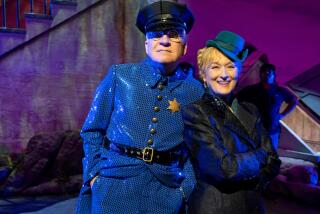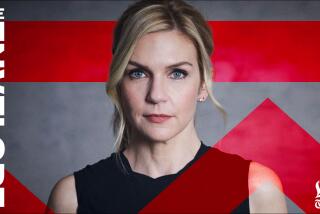Focus : R.F.K. + M.M. = Controversy : USA FILM IS THE FIRST TV PORTRAYAL OF THE ‘AFFAIR’
- Share via
“Marilyn & Bobby: Her Final Affair” promises to be controversial. It’s the first TV movie (but not the last) to deal with the alleged clandestine relationship between the country’s No. 1 sex symbol and the nation’s attorney general.
Keyed to premiere Wednesday on the 31st anniversary of Marilyn Monroe’s death, the $3.2-million movie is the most ambitious the USA network has released. It’s not intended as a docudrama or, heaven forbid, the truth. Just the possibility of the truth.
The Greeks and Shakespeare played around with history, shaping it to their dramatic purposes, and British scenarist Gerard Macdonald has done the same thing, with creative input from director Bradford May. The script is a speculative love story, a mesh of historical events and fiction covering the last four months of Monroe’s life, when she was taking drugs, coming off “The Misfits” and working on her last movie, the aborted “Something’s Gotta Give.”
Melody Anderson (“All My Children,” “St. Elsewhere”), under a peroxide coiffure, looks uncannily like Marilyn as she sits poolside in the backyard of a Studio City residence that stands in for the actual bungalow in Brentwood where Monroe died. The house figures prominently in the story as both a Marilyn/Bobby rendezvous and the site of her death, which is not depicted as a suicide.
If Marilyn was murdered, who killed her? Take your pick, says the movie’s fictional ending, from one of the following scenarios, all indirectly dramatized: Marilyn was murdered by (a) the FBI, specifically on orders from J. Edgar Hoover (Richard Dysart); (b) the Secret Service (c) Jimmy Hoffa (Thomas Wagner); (d) the Mafia, represented by Sam Giancana (Raymond Serra), and (f) the White House, i.e., President John F. Kennedy, who in the movie demands that Bobby dump Marilyn.
“I read about eight books and viewed nearly 10 hours of film on Marilyn,” says the Canadian-born Anderson. “The most influential book was Gloria Steinem’s ‘Marilyn’ because she wrote from a woman’s point of view and addressed her feminine side, which was seen as so fragmented she didn’t have an identity of her own.
“I was struck by Marilyn’s death even as a young girl. Everyone has a fantasy of who she was; we’ve all adopted her, and I had to create my own version. My hardest scene to film was Marilyn’s breakup with Bobby Kennedy. As for her death, my research leads me to believe it was suicide but that she truthfully wanted to be stopped.”
James F. Kelly, who plays Robert F. Kennedy, played him once before in “L.B.J.: The Early Years,” on NBC five years ago. “The real challenge is how do you play the private man versus the public myth,” says Kelly, in an impeccable R.F.K. accent. “For instance, I tried to break his accent down to certain qualities he had in his public voice and his private voice. I take those things and put them on like a costume.
“Jack was the playboy. Bobby was not as self-assured or sophisticated. I have chosen to make Bobby’s relationship with Marilyn an exatraordinary event in his life, like a man swept up with her effervescence.
“Nobody knows the reality of this situation. Some say it was romantic. Others say it wasn’t. We take the position that it was. It’s a perfectly valid form of dramatic entertainment. “
Co-executive producer Barry Weitz adds that “the story is not only a love story but that of a potential hit by Hoffa against Bobby. I’ll confess when I first got the script ... I felt, ‘Haven’t we seen all this before?’ Then I discovered this love story between essentially two orphans--Bobby had been shunted off to boarding schools and wound up being the runt of the litter.
“I felt a woman who had been with (Joe) DiMaggio and (Arthur) Miller and J.F.K. was finally finding real love for the first time in her life. She was suddenly realizing that this is her last chance. As for Robert, he got to feel like a little boy all over again.”
The movie was shot entirely in Los Angeles. “The challenge of shooting a period piece in L.A. is enormous because so much of ‘60s California is gone,” Weitz says. “The best we could do was re-create it in parts of Malibu, Pasadena, Santa Monica and downtown L.A.”
“On casting Marilyn, we didn’t want an impersonation or a cartoon,” says co-executive producer Jeffrey Auerbach. “It was a different Marilyn, a different face and body, by the time she got to ‘Something’s Gotta Give.’ This woman was a loose cannon. She was vulnerable, her career was on the downside, her relationship with Bobby had just ended. We take the position that attempts to save her life were possible but that there were forces that didn’t let it happen.”
“The first thing that struck me about the script,” says Thomas F. Piskura, West Coast vice president of programming for USA, “is that the writer, who is what I call a Monroe-ophile, was literate and compassionate about Marilyn. The arduous task was clearing the rights.”
Says Anderson: “To me, this is a good detective story, about how her lines were tapped to get to Kennedy. It’s important to realize this is a story. We’re using real people but it’s really a mystery story. It’s not Marilyn Monroe’s life story.”
“Marilyn & Bobby: Her Final Affair” airs Wednesday at 9 p.m. on USA and repeats Aug. 8 at 8 p.m. and Aug. 14 at 3 p.m.
More to Read
Only good movies
Get the Indie Focus newsletter, Mark Olsen's weekly guide to the world of cinema.
You may occasionally receive promotional content from the Los Angeles Times.










